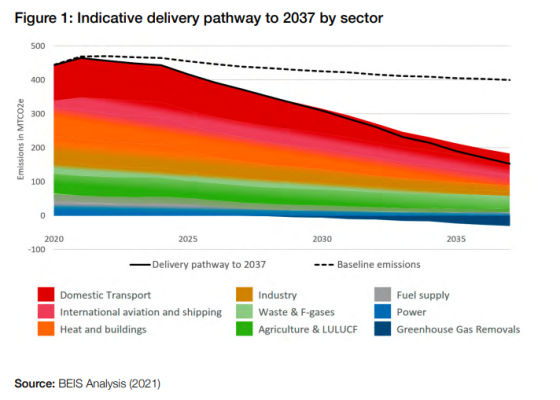
Take 5… Castles & Crenellations
From turrets and crenellations, to towers and moats, find our chosen fairy-tale properties to live out your castle dreams.


The long awaited Net Zero Strategy was published on the 19th October 2021, 12 days before the COP26 climate summit. It includes a number of policies and actions aimed at supporting the transition and reduction of emissions across the economy in accordance with the 2008 Climate Change Act.
Originally, under the Act, the UK was legally required to reduce greenhouse gas emissions by at least 80 per cent by 2050 on 1990 levels but in 2019, on advice of the Climate Change Committee (CCC), the UK committed to reaching net zero emissions by 2050 and consequently the target reduction in the Act was increased to at least 100%.
To ensure that the UK achieves the 2050 target, the Government is obliged to set legally binding, five-year caps on emissions, referred to as carbon budgets, 12 years in advance and then to publish a report setting out policies and proposals for meeting that budget. To date there have now been six carbon budgets set, covering 2008 to 2037.
The UK has already met, and overachieved, its first (2008-2012) and second (2013-2017) carbon budgets, and is on track to meet its current third (2018-2022) carbon budget. The sixth carbon budget, the first to be decided under the UK’s new net zero target, was set in June 2021. The Net Zero Strategy contains both an indicative delivery pathway and illustrative 2050 net zero scenarios. The pathway, which stretches to the end of the sixth carbon budget period in 2037, provides an indicative trajectory of emissions reductions.

As Figure 1 indicates there are a variety of sectors in our economy that will need to make serious changes in order to reduce emissions to meet the targets set out by the sixth carbon budget. And for those who own property, the Heat & Buildings key commitments, should be of particular interest as heating for homes and workspaces makes up almost a third of all UK carbon emissions.
Specifically, the Government has set the target to phase out the installation of new and replacement natural gas boilers by 2035 in line with the natural replacement cycle, to low-carbon technologies, such as electric heat pumps, or support greener-fuel alternatives to natural gas (i.e. hydrogen) to ensure that all heating systems used in 2050 are compatible with net zero.
England and Wales
To support households in England and Wales, property owners, including small landlords and private landlords will be able to apply for a £5,000 grant to install a heat pump from April 2022 under a £450m Boiler Upgrade Scheme. The scheme will not be made available to social housing and new build properties. It is part of a larger overall package worth £3.9bn to be run between 2022 and 2025 to cut emissions from buildings. However, it will only be enough to service 90,000 heat pump installations in total and the Government has pledged to install 600,000 a year by 2028.
It is our understanding that the companies installing the heat pumps will apply for the Boiler Upgrade Scheme grant on behalf of their customers, and the grant amount will be discounted from the total price homeowners pay.
Scotland
In Scotland, the Scottish Government published its Heat in Buildings Strategy on 7th October 2021. This sets out a vision and actions for the decarbonisation of heat in homes and buildings in line with Scotland’s statutory climate targets. The Scottish Government will allocate at least £1.8 billion over the next five years to support the accelerated deployment of heat and energy efficiency measures in homes and buildings.
The Scottish Government offers cashback grants to all homeowners as part of the Home Energy Scotland (HES) Loan Scheme, up to £6,000 for energy efficiency improvements and up to £7,500 for new renewable heating. It is also bringing forward the requirement for all homes to be upgraded to meet at least EPC C standards or equivalent by 2033 with the majority meeting this standard by 2030. The Scottish Government has committed to phasing out the need to install new or replacement fossil fuel boilers, in off gas areas from 2025 and in on gas areas from 2030, subject to technological developments and decisions by the UK Government in reserved areas. It is currently developing regulations which will require new buildings receiving a warrant from 2024 to use zero emissions heating and cooling.
Northern Ireland
In Northern Ireland, there are several schemes currently available to support energy efficiency improvements and the installation of lower carbon heating, including the Boiler Replacement Scheme, Affordable Warmth, and the Northern Ireland Sustainable Energy Programme (NISEP). A new Northern Ireland Energy Strategy is expected to be published by the end of 2021, which will provide further information on proposals to phase out coal and solid fuels, along with fossil fuel home heating oil. Further detail will also be provided on the transition to low carbon heating options, such as heat pumps, and future proposed support schemes, including energy efficiency and low carbon heating pilot schemes, which are intended to be launched in 2022/23.